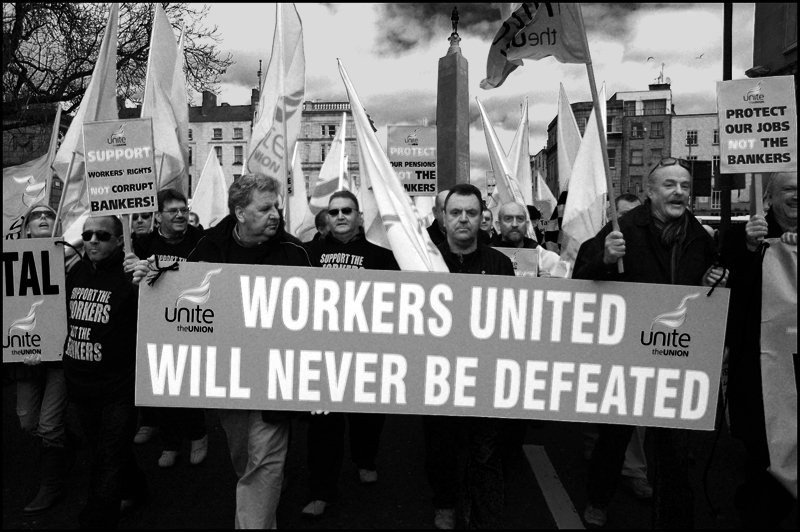Public sector workers who were listening to the radio on the morning of 30 March must have thought they misheard, when details were given of the proposals for their pay which their leaders were coming back with, following talks with the government.
Trade union leaders were supposed to be leading a campaign to reverse the savage cuts of up to 19% imposed on their pay as part of the Fianna Fail/Green Party government’s response to the economic crisis. Workers would therefore have the expectation that, even if immediate restoration were not proposed, at least a short term timetable might have been suggested during which the cuts would be reversed.
Peter McLoone of the biggest public sector union, Impact, declared that the proposed deal was “transformational” and the Chairman of the Labour Relations Commission, Kieran Mulvey, added that it was “revolutionary”. How astonished workers must have been then to learn that the proposal was that the pay cuts would not be reversed before 2014 but that the government had agreed not to increase the cuts during that time. And in return for that generosity, they would have to agree all kinds of far reaching changes to working conditions, some of which would have dreadful implications for the wages of those who depend on shift payments to increase miserable basic rates of pay.
What was astounding was that this was announced on the morning of the day when the government announced the banks bailout to the amount of a potential €40 billion of taxpayers’ funds for recapitalisation and a further €50 billion put at risk buying toxic property loans through the National Asset Management Agency. As sell outs go, this particular one by the union leaders topped all that went before and quite a few had gone before.
What it has come to now is that the trade union leaders are in reality enforcers for the international finance speculators as it is to these sharks that the wages foregone will be paid, to meet their savage interest rates as they pursue massive profits on the back of the crisis. These are the same financiers who have been speculating against the euro and Greece in particular over the past number of months.
The Wall Street Journal revealed a private dinner by eighteen Hedge Funds in New York in February where continuing speculation in Greece was discussed. These Hedge Funds, along with so called prestigious banks like Goldman Sachs, are “the markets” about which we hear so much on virtually every media discussion about the Irish government’s cuts or indeed the Greek government’s cuts.
Following every new attack on the living standards of working people, the unemployed and public services, the question is posed breathlessly by programme presenters to right wing economists and analysts, “Will this be enough to convince the markets?”, “Will the markets have confidence restored in the Irish economy?”
The Deputy Foreign Minister in Greece revealed the upshot of the power given to these sharks when he explained that one loan of €5 billion taken out would cost Greece €750 million more in interest than if it had been Germany, simply because “the markets” could manipulate the rate upward. The Greek working class is currently being pulverised with cuts in wages and increase in taxes to pay for this speculation.
In Ireland, it is the same scenario. The vicious control given to the finance speculators is covered up and never questioned in the capitalist press. One of the positive outcomes that could emerge from the current outrageous bailouts is that this whole rotten financial system is bust open for all to see, so that workers can mobilise to overthrow it and establish a radically different approach based on socialist policies











